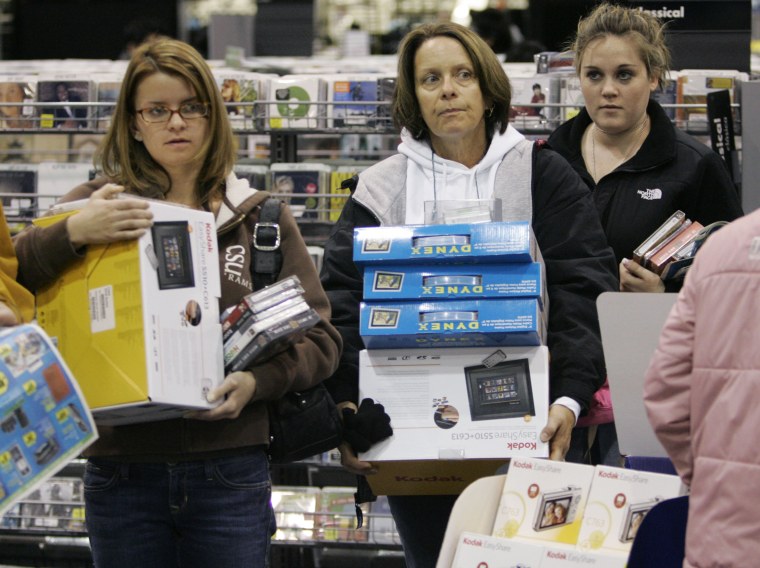Never mind the cutesy, faintly mocking name — “Mommy Tech” is a big deal at the International Consumer Electronics Show.
“We’re living in a female-driven economy,” said Jodi Kahn, executive vice president of iVillage Networks, a portal for women, who led a panel here Friday on technology for mothers.
For the first time, this week CES dedicated a series of sessions to mothers and their use of technology, which demolished stereotypes of women as technologically illiterate. The programs moved Liz Cutting, a digital imaging analyst for NPD Group, a market research firm, to exclaim, “No more inferiority complex!”
Technology analysts and marketers said the standard perception of women’s relationship with technology was seriously skewed, posing a challenge for businesses that too often focus their sales at men or — worse — alienate women with patronizing messages.
For Mom, said Tina Sharkey, president of BabyCenter LLC, a network of parenting Web sites, “technology is no longer intimidating — it’s part of her everyday life.”
BabyCenter released the final results Friday of a long-term technology survey of more than 1,000 mothers and expectant mothers. The findings go a long way toward overturning commonplace ideas of consumer technology as Dad’s toys, which Mom may or may not humor.
When families with children set out to buy a new laptop computer, for example, it is Mom, not Dad, who is more likely to initiate the discussion, the study revealed. And Mom is more likely to make the final decisions on what features to look for and how much to pay for it.
Most striking is that Mom is much more likely to use the new laptop than Dad. The survey found that 96 percent of mothers said they would make “regular use” of the device, compared to only 80 percent of fathers.
“Some moms are on the bleeding edge,” said Beth Blecherman, founder of the blog TechMamas.com, who said she was especially struck by the “amazing adoption rate for smartphones.”
“Moms are using those smartphone applications like crazy,” she said.
For mothers, tools, not toys, rule
The technology industry has been slow to target women, and especially mothers, because marketing remains focused on whizbang hardware features that appeal to men and not on practical utility, which is more likely to catch women’s eyes. While men are drawn to screen size, processor speed and other numerical specifications, women look more at price, ease of use and energy efficiency, the BabyCenter survey concluded.
“It’s not about the toys,” Sharkey said. “It’s about the tools.”As outlined by BabyCenter’s survey, the break with conventional wisdom comes with how much mothers use technology — more than generally supposed — but not so much with what they actually use it for.
What those tools help mothers do is carry out their traditional role of running the household’s daily life. They look for software and Web sites that help them keep track of their children’s health — 82 percent said they had gone to the Internet to get a second opinion about a child’s illness — and they are the primary users of media devices that help them record their children’s experiences and memories.
“She’s the chief memory officer,” Sharkey said, pointing to findings that more than 8 in 10 mothers edit and archive family photos on a computer. In fact, she said, 36 percent “never leave the home” without a digital camera.
Different markets for different spouses
That means the core markets for men and women are significantly different. Where husbands are more likely to hanker for high-definition TVs with the sharpest, biggest displays or desktop systems with the coolest operating systems, wives gravitate toward camcorders, digital cameras, laptops and multi-room home-monitoring systems, including Webcams.
Smart manufacturers and retailers will tailor their products accordingly, said Cutting, the analyst with NPD Group, who said mothers “need tech to be easy” because of their busy lives, not because they don’t understand it.
And because women are disproportionally heavy users of social media platforms like blogs, Twitter and Facebook, they are much more likely to tell their friends what they think of a product than their husbands are. That means they are the ones who are “really validating the value” of a product, she said.
Smart companies clue in
Technology marketers are beginning to get the picture, said Susan Getgood, managing director Getgood Strategic Marketing, which works with companies to build product awareness through social media strategies like reaching out to bloggers and building word-of-mouth campaigns through Twitter and other platforms.
Getgood pointed to the influence of so-called mommy bloggers who helped kill a national ad campaign by McNeil Consumer Healthcare that they felt was insulting.
The company produced Web ads in 2008 to market Motrin, depicting mothers eager to buy the painkiller to deal with the aches and pains of using baby slings to carry their infants.
“I mean, I'll put up with the pain because it’s a good kind of pain. It’s for my kid. Plus it totally makes me look like an official mom,” the ad says, voicing what its creators apparently saw as the views of a typical mother. “And so if I look tired crazy, people will understand.”
The ads were seen as patronizing and clueless, and the furious response of mothers online quickly led the company to throw in the towel.
“With regard to the recent Motrin advertisement, we have heard you,” McNeil said in an online apology. “We are parents ourselves and take feedback from moms very seriously.”
The lesson, Getgood said, is that when she uses technology to get what she wants, “Mom is not an inferior.”
